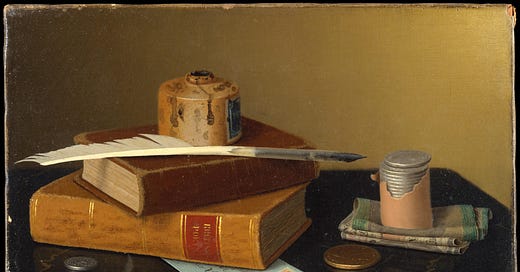The Minutiae: Please Tell Me a Story
why we should be thinking a lot more about story (and a bit less about writing)
Welcome back to the minutiae! Now I’ve actually started these, I think a bi-monthly newsletter will work better than a weekly offering. I may pop an extra one in here and there, but that means that when I make my way into your inbox, it’s with something worth your precious reading time.
And I’ll take an extra moment of that time to talk about the crisis unfolding in North Carolina following Hurricane Helene. One of our wonderful book club members, Joce, has been living in Asheville and is a witness to the devastation (and do keep up with her updates on Instagram as linked). Here is a link to a community resource which opens with a selection of ways you can help, including this useful article. I hope any of you who are based in the area are safe, and I’m hoping for relief and aid for you soon.
Today’s newsletter we’re talking about storytelling, because I think we’re living in an era of bad storytelling, or at least we seem to have forgotten its value. This goes for film and tv also (can we please find good writers again and then pay them really well?) but of course today we’re talking about novels. This is me trying to work out what makes a good story.
What makes for a good story? Or should it be, what makes a good storyteller? I don’t need to tell you that stories, narrative, are an innate part of the human experience. What are science or religion or politics or gossip, even, but particular kinds of narrative? And the better you tell your story, the more minds you capture, whether it be fictional or not.
I also think most of us can almost intuitively recognise a well told story from a badly told one. Just think of any social setting you’ve been in; people are drawn to the good storytellers and bored stiff by the less gifted. Stories can be slippery, then. Perhaps they can lead you astray, just by virtue of being engaging, well told. But that’s a thought for another day.
Fictional stories can obviously take many forms (poems, song, dance, film, tv, theatre), but—you know me—I’ve been thinking about their relationship to novels. The novel is fundamentally a storytelling form, a “long, fictional narrative”. And I’ve slowly come to realise that one of the main things I’m looking for in my books is good storytelling, at least the books I intend to actually enjoy. This may sound incredibly obvious, and perhaps it is slightly damning that it’s taken me this long to work that out. But I’d say it’s at least a little more subtle than it seems on the surface. Today we’re going to take a stab at what might make a good story versus a bad one.
plot v. story
First of all, I don’t mean plot. In fact, distinguishing between those plotless novels I do and don’t like has been a big help in figuring out that what I’m really looking for is story. The one thing I’ve googled for today’s piece is ‘story vs. plot’ and the internet told me that a story is the complete vision of the narrative, with all the details filled in, while plot is only the points you might choose to show, to actually narrate in words. To a degree, I agree. A less plotted novel will have a much harder time of also conveying a good story, but not necessarily. A highly plotted novel might have the immediate upper hand, but if it’s narrated badly, it too will fail.
But it is much harder to figure out what it is that defines a good story, like the thing itself. Perhaps because it partly exists somewhere behind or in between the words themselves. Or is it the way the words, the scenes, are fitted together, the way they progress? Does a good storyteller make better decisions as to which parts of the story are picked to enter the plot? I think the interplay between story and plot, what is said and unsaid, is a vital part of the process.





